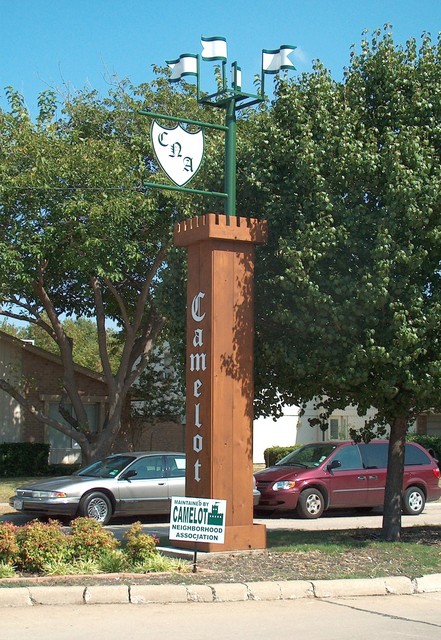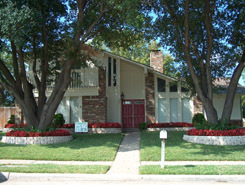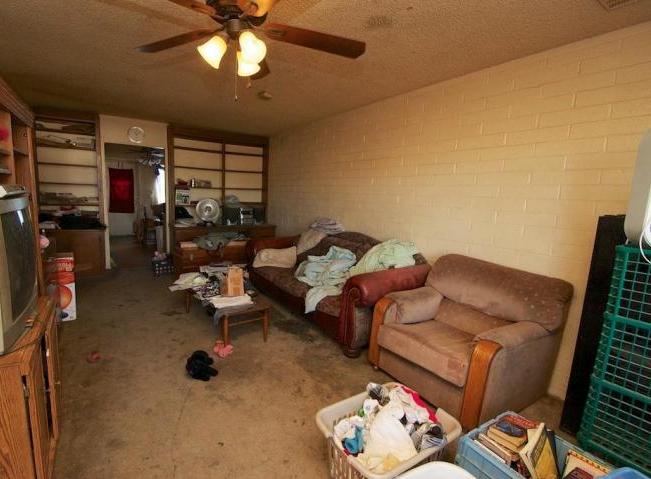The Camelot Neighborhood Association (CNA) is a voluntary organization comprised of interested citizens throughout the neighborhood.
CNA has always been a pioneer. It’s the oldest voluntary neighborhood association in Garland, Texas. Today it continues to lead the way, maintaining one of the most effective online communities in the country.
Since its inception, CNA has had a significant impact on the quality of life in Camelot in the form of crime prevention, appearance of the neighborhood, zoning, and many other issues. All of these efforts have been augmented by the effective use of the tools available through it’s Neighborhood Link website www.camelotna.com
What Does the Camelot Website Offer?
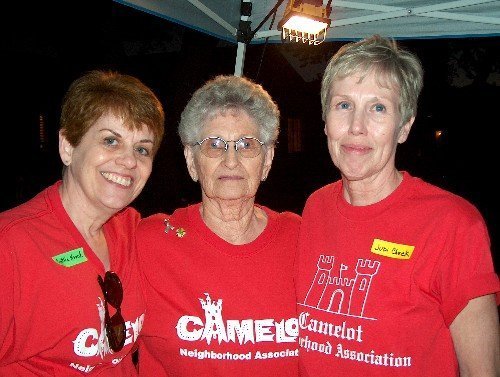
The CNA website is not a fixed or dormant page of neighborhood information. The residents have used FREE Neighborhood Link utilities to produce a dynamic site with communication between neighbors, city officials, and local law enforcement.
CNA has a Crime Watch program in place, and they include a monthly report of all crimes that have occurred in the neighborhood in their monthly newsletter. Crime stats are updated on the website as they are received.
The impressive communication innovations required no special computer savy on the part of the Camelot neighbors. There was no need to hire an expensive computer programmer or technical ‘geek'. No training in scripting languages or even rudimentary knowledge of HTML was required.
Camelot Website Success Stories
Camelot association volunteers constantly update their website to provide up-to-date information for the nearly 1600 families in Camelot. Interaction between neighbors on the website provides everything from pictures of the ‘Yards of the Month’ to a ‘CNA Membership Form’ for new residents.
Using the online Neighborhood Link tools Camelot residents have:
- Reported suspicious vehicles
- Allowed neighbors to report drug activity without fear of retaliation
- Aided in the recovery of lost pets
- Increased neighborhood volunteerism
- Banded together in efforts to proactively stop crime
- Given neighbors an easy way to report street light outages to Oncor and GP&L
- Facilitated online Crime Watch Alerts
- Informed neighbors how to opt out of promotional marketing
- Disseminated information about meetings with police and city officials
- Facilitated posting information to the Newsletter 'The Knightly News'
- Helped families find information about code compliance
- The list is endless...
Everyone is Welcome!
The Camelot neighborhood is comprised of nearly 1600 homes within the boundaries of Shiloh Road, Jupiter Road, Arapaho Road and Campbell Road in Garland, Texas. Everyone in Camelot is welcome to attend the monthly association meetings (third Sunday of each month except October and December). The meetings are held at 6:30 p.m. at Concordia Lutheran Church, 5702 N. Jupiter Road -- Neighbors can have some fun, and find out what is going on in the neighborhood.
Camelot Neighborhood Association History
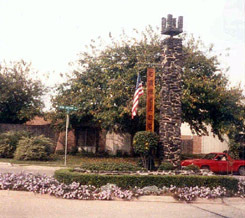
CNA was formed in 1980 as the Camelot Homeowners Association. At that time, the Safeway grocery store at the northeast corner of Arapaho and Jupiter was the only retail store at that intersection. There were no signal lights at the intersection, just four stop signs. Jupiter was a two-lane road, and Arapaho was two lanes from Plano Road to its termination point at Galaxie. There were no houses on the east side of what is now Callejo and was then Shiloh. All of the houses on the north side of Gallahad were Centennial model homes. The Association’s name was changed to Camelot Neighborhood Association in April 1992, to encourage both homeowners and renters to join and become involved.
Sally Baskett and Elsie Mosqueda did the groundwork of forming the Association. They passed out flyers and held meetings in their homes. Each of them had been members of associations in the cities where they had lived before moving to the Camelot area. By their choice, neither of them ever held an official leadership position in the Association once it was formed. Carolanne and Ross Watson brought Neighborhood Watch to Camelot that first year, and they personally knocked on every door in Camelot to sign everyone up.
The adoption of by-laws for the Association was an interesting event. The meeting at which they were adopted was held at what was then the Richland United Methodist Church (the church on Jupiter about a quarter of a block north of Collins). Approximately thirty individuals attended the meeting. It seemed as though every word was subjected to debate. I was amazed at the number of “legal" experts within that group.
The initial dues were $1 per month for each household that elected to become a member. In about 1990, after considerable discussion, the dues were raised to $1.25, and a few years later to $1.75. To simplify administration, beginning in 2000, dues became a flat $21 per year or $10.50 if joining after July 1; in 2005, $25 and $12.50 respectively. In 2009, PayPal was offered as a payment option for the first time.
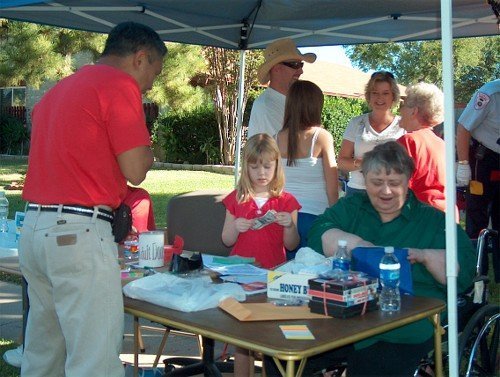
One of the first issues with which the Association was confronted was the lack of personnel to man the ambulance parked at the fire station that served and still serves this neighborhood (Station #6, located on Holford Road). The situation was discussed with City staff, and I believe that personnel was provided for the ambulance in the next budget year.
A later issue involved electric rates being paid by Camelot residents served by what was then Texas Utilities (TU Electric). At the conclusion of a presentation he was making concerning the reduction of electric bills, a TU representative pointed out that Camelot residents were paying Garland Power & Light (GP&L) rates, which were considerably higher than TU rates. It was learned that the paying of GP&L rates by Garland residents served by TU was the result of a state sanctioned agreement reached many years earlier between the City of Garland and TU. Getting state approval to permit those residents to pay TU rates turned out to be a many-month process. Then Garland Mayor Ruth Nicholson worked long and hard to bring about that approval.
An issue involving the safety of some children attending Big Springs Elementary School surfaced around 1985. At that time, the street in front of the school was a two-lane road. Students who lived east of the school and walked to school had to walk on the edge of the blacktop on which automobiles were driven. Within a short time after the situation was called to the attention of the City Council, sidewalks were placed on the north side of the road.
Another issue was a statement made to prospective home buyers by some of the Centennial Homes sales persons that what is now the lakes portion of Camelot would become a city park. That fact was brought to the attention of the President of Centennial Homes, Fred Roach. After considering various alternatives, he arranged for Centennial Homes to pay for installing the picnic tables and wooden play equipment which are still on the playgrounds of the Big Springs Elementary School.
Through the years, the Association has been involved in many other issues, including zoning cases, problems with streets and street lights, water being drained out of one of the lakes, and erosion.
Current CNA Projects
Annual Picnic – The Annual Picnic is a continuation of a tradition that commenced the year after CNA was formed. The by-laws of the Association require an annual meeting at which officers will be elected and changes to the by-laws can be made. Initially, those meetings were held on a Sunday afternoon at Big Springs Elementary School. For a few years, they were Saturday evening dinner events held at various restaurants. Since about 1990, they have been outdoor events. A chili cook-off became part of the picnic festivities in 2004. Attendance has grown from as few as two dozen to as many as 200.
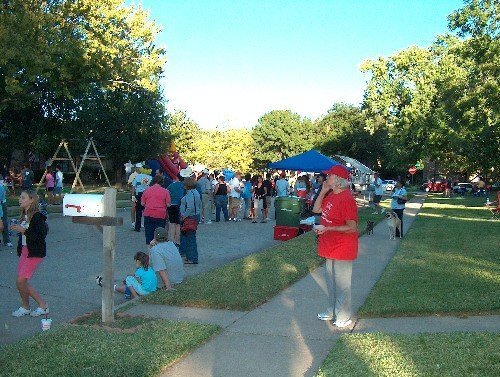
Maintenance of King Arthur Median – The assumption of the responsibility for maintaining the King Arthur median was a reaction by Association leadership to an unanticipated event. Prior to the formation of the Association and for about five years after its formation, the median was maintained by Centennial. Early in the spring of the year that Centennial closed its model homes in Camelot (about 1985), it became very apparent that no one was maintaining the median. City staff confirmed that the median is City property, and the City is responsible for maintaining it. Staff also pointed out, however, that maintenance by the City would be limited to about a once-a-month mowing.
An agreement was reached with City staff that the Association would assume responsibility for maintaining the median, and the City would bear the cost of, as I recall, $300 of water. For a few years, only volunteer help was used to maintain the median. Since 1990, the Association has paid for mowing and other costs associated with maintaining the median although volunteers still maintain the flowerbeds and run the sprinklers. The Association also paid for the sod placed on the Collins median and for mowing it.
Yard of the Month – This program came into being about five years after the association started. It was a replacement for the Garden Club. For purposes of the Yard of the Month program, Camelot is divided into five areas. During a six-month period each year (May-October), a yard within each area is designated as Yard of the Month. The Yard of the Year is recognized at each year’s annual picnic. Etta Mauldin headed the program for many years. Joan Engle took over in 1998 and Maria Cudhea in 2000. Etta Mauldin was again Beautification Chair until her retirement in 2004. Robin White handled the duties in 2004, and Debbie Starling took over the reins in 2005.
Monthly Newsletter – A newsletter, not always monthly, has been issued throughout the entire existence of the Association. Initially it was hand delivered; however, since about 1985, it has been mailed to CNA members. Carolanne Watson was the creator of the newsletter and its editor for a number of years. She and Judy Rivera laid the groundwork for what the newsletter is today. Over the years, the newsletter was also produced by Ruth Bogard, Rick Sobol, Lois Hyatt, Sally Martin, Kathleen Warzyk, Pat Karacostas, Lynn Frank, Daryl Beckman and Bonnie Hunt. Judi Cheek and Cynthia Houck have been Co-Editors of The Knightly News since 1999.
The easiest part of CNA's existence was its formation. Since that time, it has experienced the ups and downs that can be expected of any volunteer group. The “glue” that has enabled it to survive and be effective is the continued existence of a core group. Sometimes the number in that group has been limited to three or four individuals. The membership has changed throughout the years. What has not changed, though, is the dedication of the group.
 Print
Print Email
Email